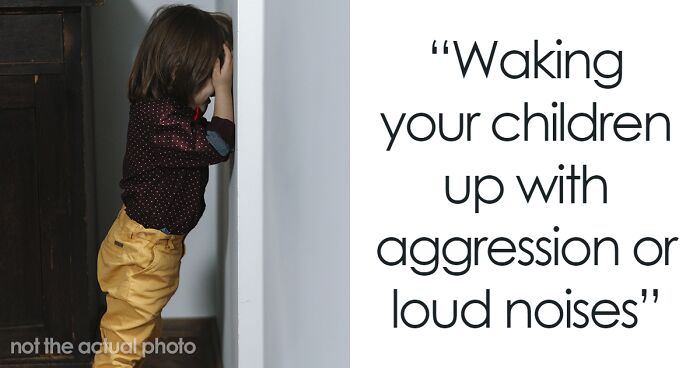
“I Am Begging Parents To Stop”: Therapist Lists The Absolute Worst Behaviors That Cause Trauma
InterviewMost parents try to do their best when raising children, but certain behaviors—often likely stemming from the way they were raised themselves—can have a serious negative effect on their little ones, even if that was never the intention.
Canada-based trauma therapist Morgan Pommells recently addressed moms and dads out there, asking them to put an end to some of the behaviors they tend to engage in in front of their children. Describing some rather toxic behavior, a series of Pommells’s posts went viral and seemingly touched quite a few people who could relate, as netizens opened up about experiencing it firsthand.
Bored Panda got in touch with Morgan Pommells, who was kind enough to answer a few of our questions and delve deeper into how such behavior can affect a child. You will find her thoughts in the text below.
Parents’ behavior tends to have a strong and long-lasting effect on the well-being of their child
Image credits: Keira Burton (not the actual photo)
Trauma therapist Morgan Pommells addressed parents, asking them to stop certain behaviors
Image credits: morganpommells
Image credits: morganpommells
Image credits: morganpommells
Image credits: morganpommells
Image credits: morganpommells
Image credits: morganpommells
Image credits: morganpommells
It’s important not to overlook the toxic behaviors
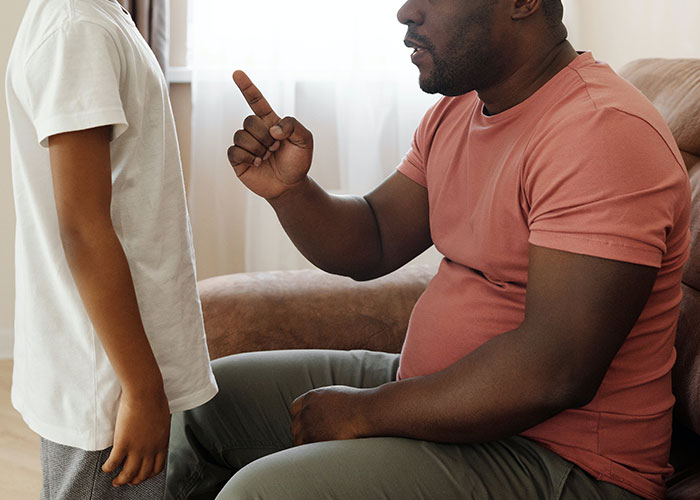
Image credits: August de Richelieu (not the actual photo)
“These detrimental behaviors are far more common than we often acknowledge, largely due to outdated parenting approaches that emphasize control and discipline over emotional nurturing and understanding,” Morgan Pommells, MSW, told Bored Panda in a recent interview.
“This trend, a legacy of past generations, favored emotional suppression and ‘tough love,’ unwittingly continuing cycles of emotional immaturity and disconnection. Against this backdrop, it’s essential for survivors of emotionally immature parents to realize the legitimacy of their harm, regardless of its subtlety.”
Pommells continued to explain that these ‘micro-experiences,’ frequently overlooked, can profoundly impact a child’s self-esteem and their overall emotional health. “By calling attention to these specific behaviors, we’re not only highlighting the more blatant forms of abuse but also shedding light on the more insidious, often unnoticed actions that inflict lasting emotional scars.”
The expert suggested that the effort of shedding light on such behaviors is vital, not just for validating survivors who might internalize blame due to the less overt nature of their trauma, but also for alerting parents to the seemingly minor yet potentially harmful behaviors they might unknowingly exhibit.
Coming from a parent, such behavior can significantly affect the child’s self-esteem and nervous system
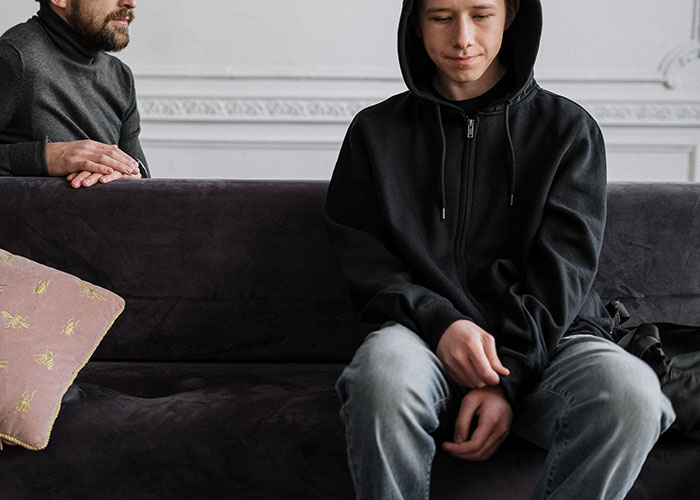
Image credits: cottonbro studio (not the actual photo)
Statistics reveal a bitter truth that many people consider their family dysfunctional for one reason or another (according to Forbes, as much as 70%-80% of them do). Toxic parenting and the behaviors mentioned in Pommells’s posts, which often result in quite detrimental outcomes, are likely to be among such reasons.
“These behaviors profoundly affect a child’s developing self-esteem and nervous system. Behaviors like yelling, criticizing, and shaming can trap a child in a perpetual state of traumatic stress. This results in anxiety, persistent rumination, deeply ingrained feelings of inadequacy, and a pervasive sense of never being ‘good enough’,” Pommells pointed out.
“Recognizing and addressing these behaviors is not just about preventing immediate distress; it’s about safeguarding the child’s long-term emotional and psychological well-being.”
Instead of exhibiting toxic behavior, parents should focus on emotional regulation and relationship repair

Image credits: Keira Burton (not the actual photo)
When discussing the behaviors parents should be engaging in when creating a relationship with their children, Morgan Pommells emphasized that there are two fundamental principles for this: emotional regulation and relationship repair.
“For the former, mastering your emotional responses—ensuring you’re not taking your frustration or negative moods out on your child—is essential. This mindfulness prevents inadvertent and disproportionate harm,” she explained.
“For the latter, it’s equally important to embrace relationship repair. Inevitably, parents will cause hurt. The more important factor is your commitment to acknowledging, apologizing, and mending the damage. This process teaches children about accountability, resilience, and it allows them to not internalize everything their parents did to them as their fault.”
Quite a few netizens have seemingly experienced such behavior firsthand
People opened up about their experiences
Poll Question
Thanks! Check out the results:
Ah, an exact description of my parents. And people still call me a 'red flag' when I say I dont contact them.
Many of those pièces of advice also apply between adults. Putting guilt on someone or telling them to "relax" when you behave like sh*t is a douche move adults can do too.
One good way to stop the cycle is to decide not to have children. I know I’m going to get grief for saying it, but with the number of people deciding not to have kids these days, I do wonder if some of these cycles of violence and cruel behavior might stop, or at least decrease. I guess we’ll be seeing the results in about twenty years or so.
Ah, an exact description of my parents. And people still call me a 'red flag' when I say I dont contact them.
Many of those pièces of advice also apply between adults. Putting guilt on someone or telling them to "relax" when you behave like sh*t is a douche move adults can do too.
One good way to stop the cycle is to decide not to have children. I know I’m going to get grief for saying it, but with the number of people deciding not to have kids these days, I do wonder if some of these cycles of violence and cruel behavior might stop, or at least decrease. I guess we’ll be seeing the results in about twenty years or so.

 Dark Mode
Dark Mode 

 No fees, cancel anytime
No fees, cancel anytime 







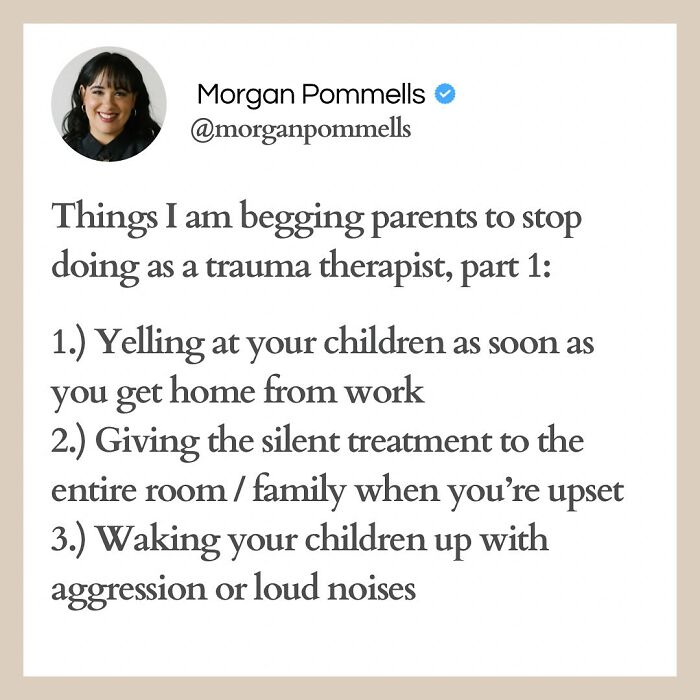
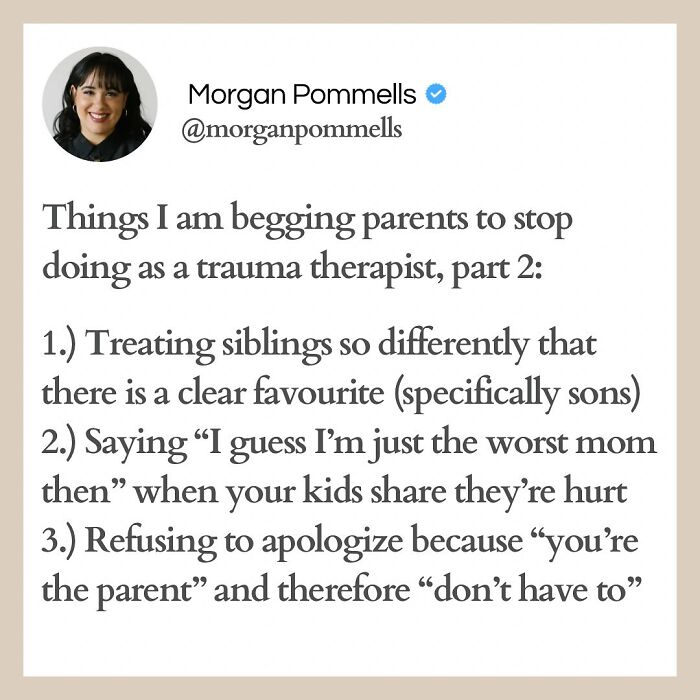
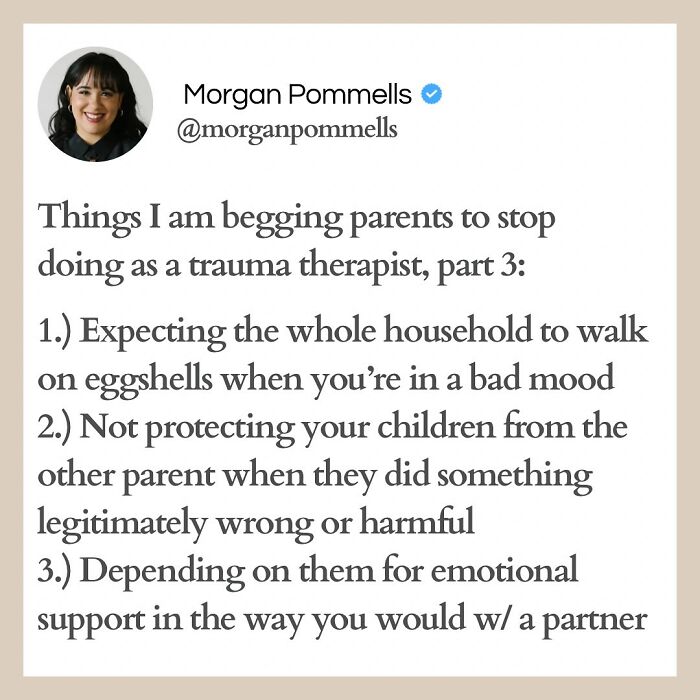
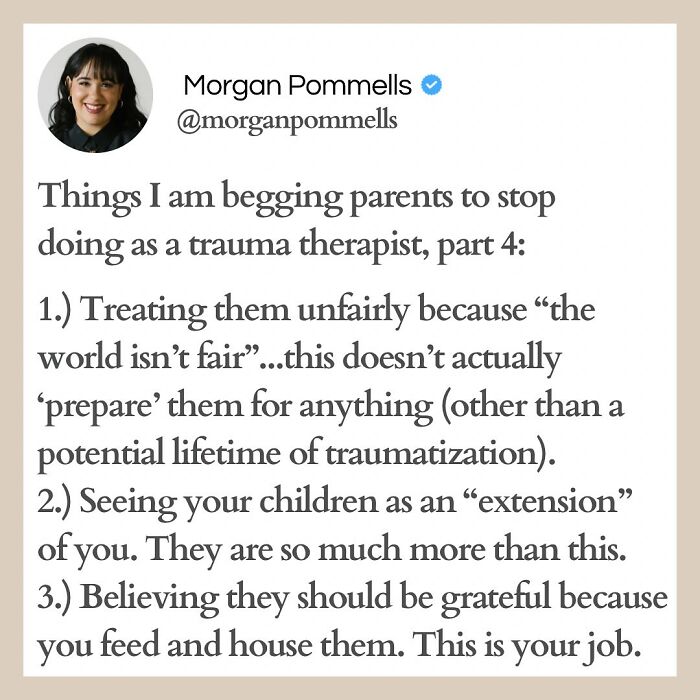
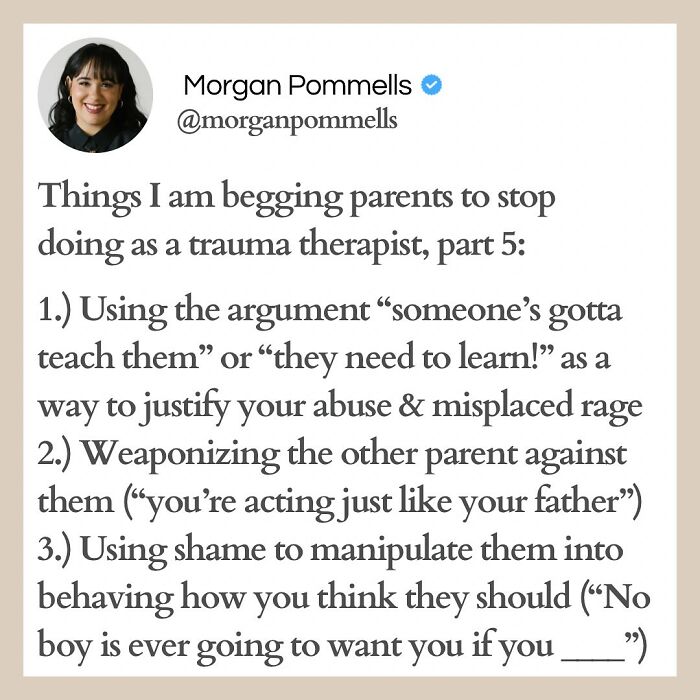
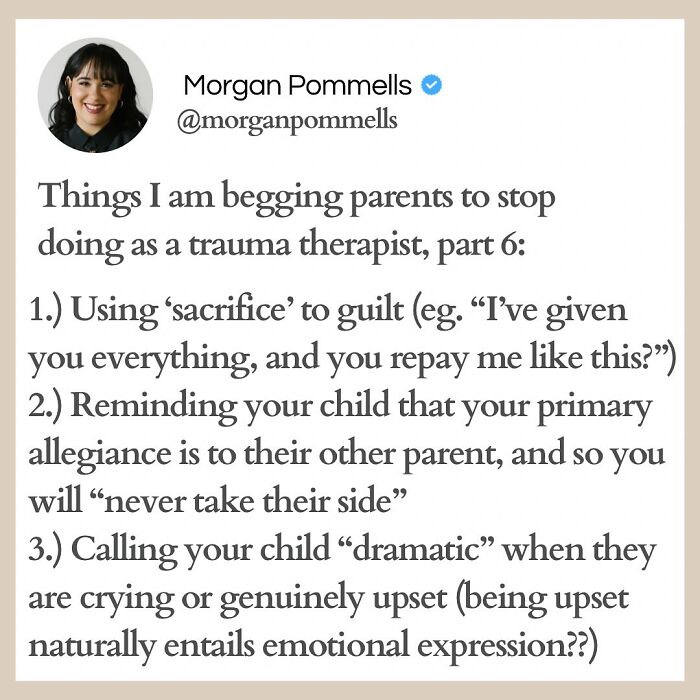
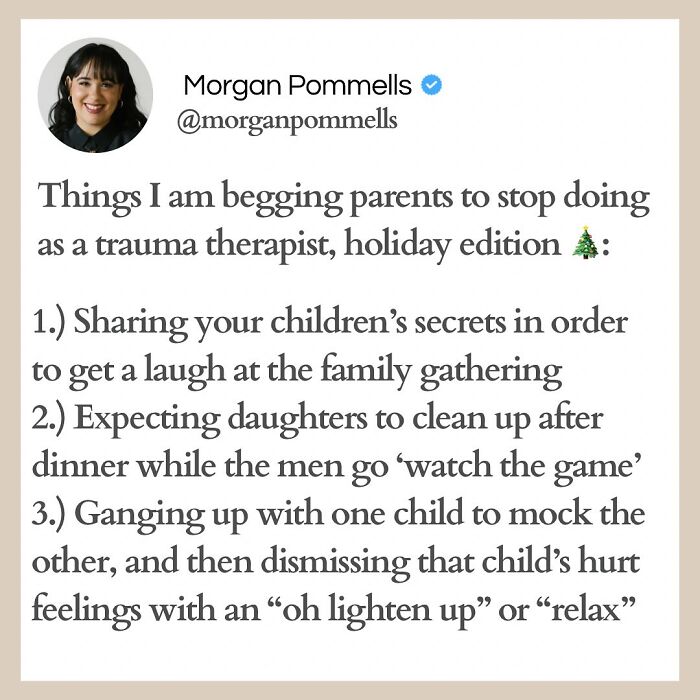
















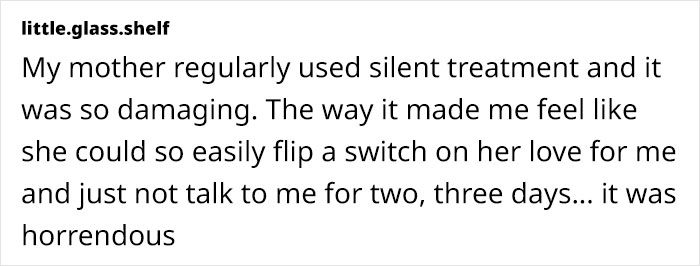
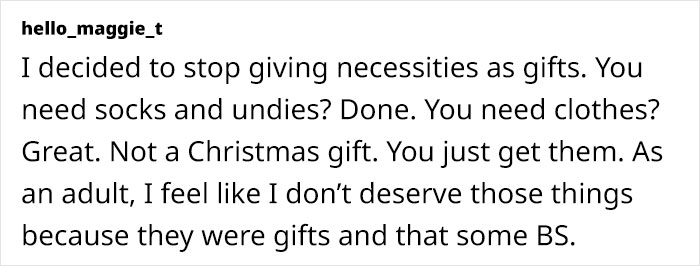












































96
78